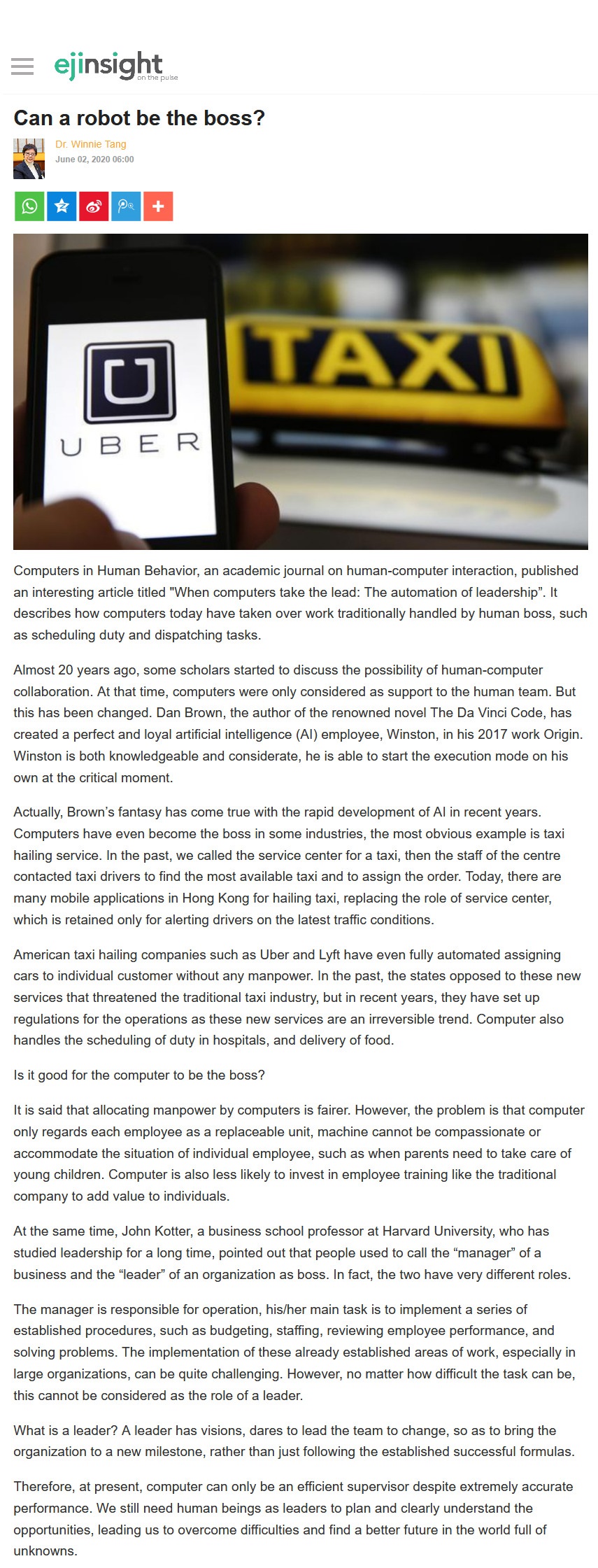網上版請按此

Can a robot be the boss?
Computers in Human Behavior, an academic journal on human-computer interaction, published an interesting article titled "When computers take the lead: The automation of leadership". It describes how computers today have taken over work traditionally handled by human boss, such as scheduling duty and dispatching tasks.
Almost 20 years ago, some scholars started to discuss the possibility of human-computer collaboration. At that time, computers were only considered as support to the human team. But this has been changed. Dan Brown, the author of the renowned novel The Da Vinci Code, has created a perfect and loyal artificial intelligence (AI) employee, Winston, in his 2017 work Origin. Winston is both knowledgeable and considerate, he is able to start the execution mode on his own at the critical moment.
Actually, Brown's fantasy has come true with the rapid development of AI in recent years. Computers have even become the boss in some industries, the most obvious example is taxi hailing service. In the past, we called the service center for a taxi, then the staff of the centre contacted taxi drivers to find the most available taxi and to assign the order. Today, there are many mobile applications in Hong Kong for hailing taxi, replacing the role of service center, which is retained only for alerting drivers on the latest traffic conditions.
American taxi hailing companies such as Uber and Lyft have even fully automated assigning cars to individual customer without any manpower. In the past, the states opposed to these new services that threatened the traditional taxi industry, but in recent years, they have set up regulations for the operations as these new services are an irreversible trend. Computer also handles the scheduling of duty in hospitals, and delivery of food.
Is it good for the computer to be the boss?
It is said that allocating manpower by computers is fairer. However, the problem is that computer only regards each employee as a replaceable unit, machine cannot be compassionate or accommodate the situation of individual employee, such as when parents need to take care of young children. Computer is also less likely to invest in employee training like the traditional company to add value to individuals.
At the same time, John Kotter, a business school professor at Harvard University, who has studied leadership for a long time, pointed out that people used to call the "manager" of a business and the "leader" of an organization as boss. In fact, the two have very different roles.
The manager is responsible for operation, his/her main task is to implement a series of established procedures, such as budgeting, staffing, reviewing employee performance, and solving problems. The implementation of these already established areas of work, especially in large organizations, can be quite challenging. However, no matter how difficult the task can be, this cannot be considered as the role of a leader.
What is a leader? A leader has visions, dares to lead the team to change, so as to bring the organization to a new milestone, rather than just following the established successful formulas.
Therefore, at present, computer can only be an efficient supervisor despite extremely accurate performance. We still need human beings as leaders to plan and clearly understand the opportunities, leading us to overcome difficulties and find a better future in the world full of unknowns.
Dr. Winnie Tang
Adjunct Professor, Department of Computer Science, Faculty of Engineering and Faculty of Architecture, The University of Hong Kong